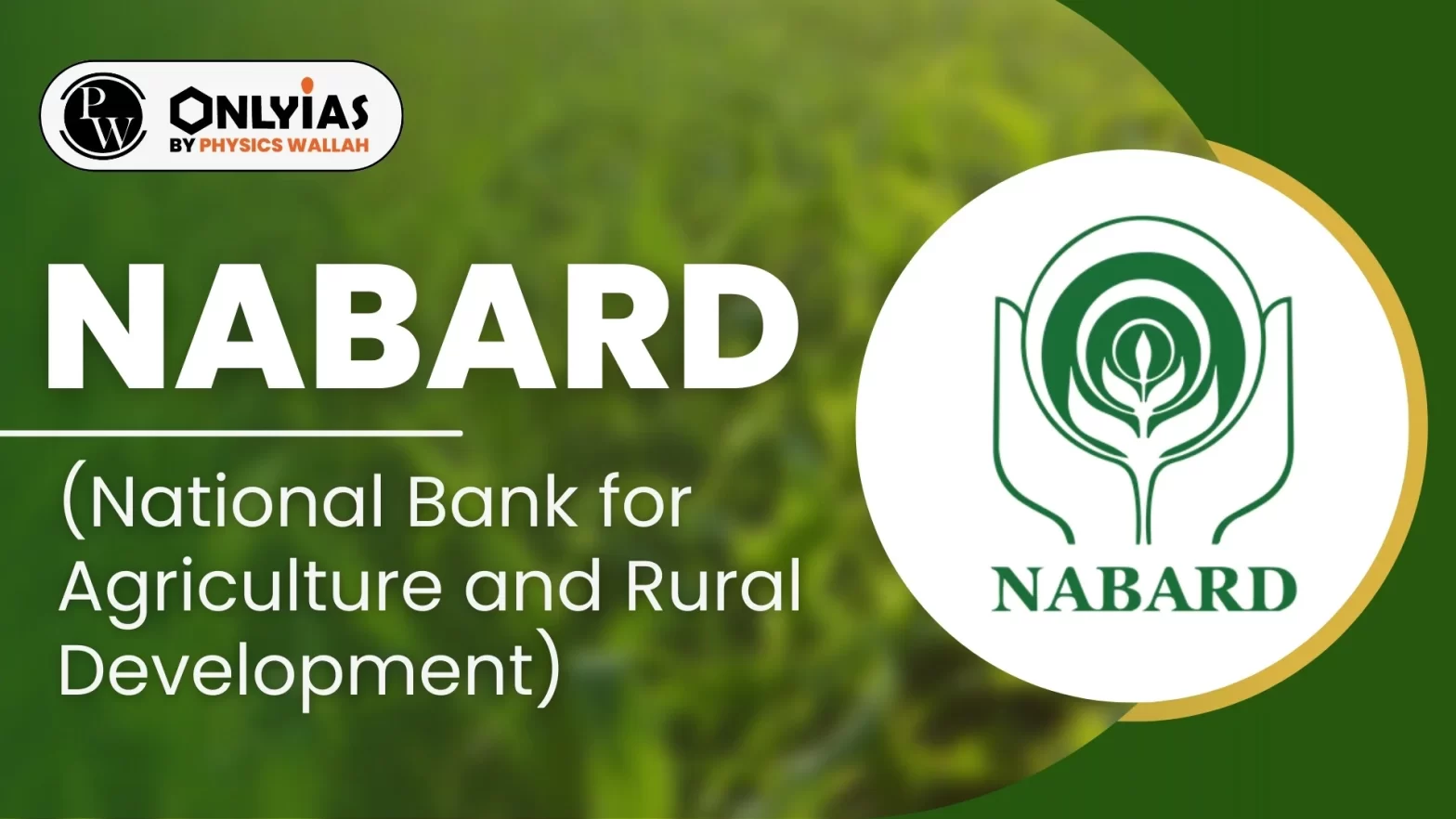NABARD full form is National Bank for Agriculture and Rural Development. Know about its headquarters in Mumbai, chairman Shaji K V, key functions, objectives, and major initiatives promoting rural credit, infrastructure, and inclusive growth.

NABARD (National Bank for Agriculture and Rural Development) is India’s apex development financial institution dedicated to promoting sustainable and equitable agriculture and rural development. It was established on July 12, 1982, through an Act of Parliament, marking a key step in the nation’s journey toward rural prosperity. Headquartered in Mumbai, NABARD has significantly transformed the rural landscape of India through innovative financing mechanisms, infrastructural support, policy formulation, and institutional development.
NABARD is the principal institution in India responsible for overseeing the development of agriculture and rural infrastructure. Its broad mandate includes credit planning, financing, supervision, and development activities to foster rural prosperity. The NABARD full form is National Bank for Agriculture and Rural Development, which reflects its primary focus and mission.
| NABARD Overview | |
| Particulars | Details |
| NABARD Full Form | National Bank for Agriculture and Rural Development |
| What is NABARD | Apex Development financial institution for agriculture and rural development in India |
| NABARD Established | 12 July 1982, under an Act of Parliament |
| NABARD Headquarters | Mumbai, Maharashtra |
| NABARD Chairman | Mr. Shaji K. V |
| Ownership | 100% Government of India |
| Vision | Development Bank of the Nation for Fostering Rural Prosperity |
| Mission | Promote sustainable and equitable agriculture and rural development through financial and non-financial interventions |
| Key Functions | Credit provision, refinancing, supervision, infrastructure funding, policy support |
| NABARD Functions and Objectives | Support agriculture, rural infrastructure, financial inclusion, and institutional development |
| Subsidiaries | NABKISAN, NABFINS, NABCONS, NABFOUNDATION, NABVENTURES, NABSAMRUDDHI, NABSanrakshan |
| Major Initiatives | SHG-Bank Linkage, Kisan Credit Card, Watershed Development, RIDF, UPNRM |
| Regional Offices | 31 Regional Offices + 1 Cell in Srinagar |
| Training Establishments | 4 (Northern, Eastern & Southern India) |
| District Development Managers | 415 functioning at the district level |
| Partner Institutions | Commercial Banks, RRBs, Cooperative Banks, NBFCs, NGOs, FPOs, State Governments |
| Primary Areas of Operation | Agriculture finance, rural development, infrastructure, microfinance, capacity building |
| Website | www.nabard.org |
The NABARD full form is National Bank for Agriculture and Rural Development. It is a premier development financial institution in India, dedicated to strengthening rural economies by facilitating credit, infrastructure, and institutional support for agriculture and allied sectors. The name itself reflects the core mandate of the institution—supporting agricultural prosperity and comprehensive rural development through financial and policy-based interventions.
The roots of NABARD lie in the recommendations of the Committee to Review Arrangements for Institutional Credit for Agriculture and Rural Development (CRAFICARD), constituted under the chairmanship of Shri B. Sivaraman in 1979. Based on its recommendations, NABARD was established by the Parliament through Act 61 of 1981. On 5 November 1982, it was formally dedicated to the service of the nation by the then Prime Minister, Smt. Indira Gandhi.
To streamline rural credit delivery, NABARD inherited the agricultural credit functions of the Reserve Bank of India (RBI) and the refinance functions of the Agricultural Refinance and Development Corporation (ARDC).
India’s Banking Sector And Monetary Policy
The NABARD Chairman holds the key responsibility of steering India’s apex rural development financial institution toward achieving its vision of fostering rural prosperity. The Chairman leads the formulation and execution of policies, oversees operational strategies, and ensures alignment with the Government of India’s objectives related to agriculture and rural development.
As of 2025, Mr. Shaji K V is the Chairman of NABARD. With a distinguished career in rural and agricultural banking, he brings decades of experience in financial services, having served in various leadership roles at Canara Bank and the Reserve Bank of India.

Source: PIB
Mr. Shaji’s visionary leadership continues to uphold NABARD’s mission of enabling equitable and sustainable rural transformation through participatory financial and developmental interventions.
The NABARD Headquarters serves as the central command of the National Bank for Agriculture and Rural Development, from where all policy, finance, development, and supervisory operations are coordinated.
Strategically located in the financial hub of Mumbai, Maharashtra, the headquarters houses the top leadership, key functional departments, policy-making bodies, and national-level operational teams.

Source: Wikipedia
The headquarters functions as:
NABARD’s Mumbai office is not just an administrative unit but a center of innovation and decision-making that drives the vision of rural upliftment and economic sustainability across India.
The functions of NABARD are comprehensive and touch every aspect of rural life. Broadly categorised, the NABARD functions and objectives include:
NABARD has been at the forefront of landmark projects and innovations. Some landmark initiatives by NABARD include:
To extend its developmental mandate, NABARD operates through seven specialised subsidiaries:
Each subsidiary caters to a specific domain, ensuring holistic rural development.
NABARD collaborates with a range of institutions, including:
The significance of NABARD in India’s rural development cannot be overstated. Through its multifaceted approach, NABARD:
Its strategic interventions have helped millions of rural Indians gain access to credit, training, infrastructure, and support services. NABARD’s influence is felt in nearly every village and block of the country, making it a cornerstone of India’s rural development framework.
In essence, NABARD is the backbone of India’s rural financial architecture. From refinancing rural credit to supervising rural banks, from funding sustainable agriculture to empowering women and artisans, NABARD functions seamlessly to transform the socio-economic landscape of rural India. Its unwavering commitment to innovation, institutional growth, and inclusive development ensures it remains a Development Bank of the Nation for Fostering Rural Prosperity.
As India continues its journey toward becoming a global economic power, NABARD’s role in ensuring balanced regional development and financial inclusivity will be more critical than ever. By understanding What is NABARD, acknowledging its functions and objectives, and recognising its impact, we appreciate the silent yet significant revolution it leads in the rural heartlands of India.
Ready to boost your UPSC 2025 preparation? Join PW’s UPSC online courses today!
NABARD is the National Bank for Agriculture and Rural Development, which promotes sustainable rural and agricultural development in India.
The NABARD full form is National Bank for Agriculture and Rural Development, established to support rural credit and development.
NABARD was established on July 12, 1982, under an Act of Parliament to enhance institutional rural credit and development.
The NABARD headquarters is situated at Bandra-Kurla Complex, Mumbai, Maharashtra.
As of 2025, Mr. Shaji K V is the NABARD chairman, steering policies for agricultural and rural development.
Key NABARD functions and objectives include rural credit, infrastructure funding, financial inclusion, and capacity building of rural institutions.
<div class="new-fform">
</div>
